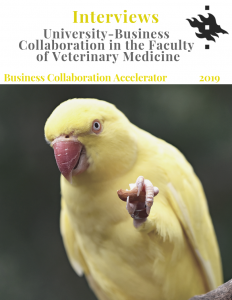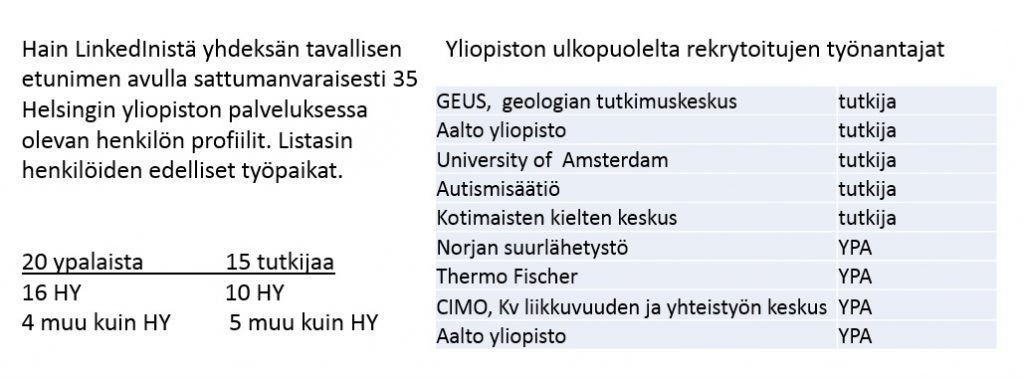University of Helsinki’s Business Collaboration unit has acquired piloting license to Teqmine patent search tool. This tool allows its users to generate patent landscape and see relevant patenting activity by using their chosen text as an input. For researchers this enables opportunity to use their publications as a base for patent search in the field of their expertise.
From fixed degrees to a collection of skills
University of Helsinki is contemplating its new strategy for 2020-2030. Everybody is engaged in the process. The staff were encouraged to identify global and regional changes that would likely affect the university. The task was challenging. So many things are in turmoil at the same time – yet it is difficult to see the weak signals and forecast the future.
I am willing to wait for another 40 years to see, if my thoughts were even close to the reality in 2059.
I can see is that the world is getting increasingly complicated. Deep understanding and specialized skills aren’t needed only for research and making new inventions but also for everyday jobs. Each nurse, electrician, car service person or librarian require more specialized skills than ever before. These narrow skills are rarely included in school curriculum as they tend to change fast. New programs, tools and applications are taken into practice almost on daily basis. Mastering the right skills is essential in working life.
In my youth a good CV had information about basic education, perhaps a degree from a nice university and a mention of some further studies in the form of short courses.
If specialized skills gain more influence, won’t this change the CVs as well? Shouldn’t the whole education system change? If employers seek for persons who have certain skills, why don’t they simply compare them with our skills sets.
Does the university degree matter anymore?
At present we encourage our students to study full degrees, because the funding instruments require us to do. They need to accomplish bachelor’s degree in three years and master’s in five years. We don’t let them include courses from another faculty to their degree without a permission. Thus, we have predetermined the skills combinations.
Why do we want to make the decision of suitable combinations what to study? Does the university know how the working life will be in 20 years? At present a physicist has rarely studied any biology. An engineer doesn’t know much about law. Shouldn’t we let the students decide what kind of skills match their needs? And furthermore, shouldn’t we let the students from other institutions and adults from working life join our classes?
Supplementing your personal skill set will become a major business very soon.
I would like to present a forecast: those universities and schools that welcome all students to their accredited courses will succeed and gain respect from the society. The governments and employers will also fund them.
Keeping universities as closed entities is slowly coming to its end. All students, including those studying online need to get access to our courses. The funding mechanisms can be adjusted to it. I see the future bright. It may cause competition between institutions, it may require accrediting of courses, but it will also allow people to use a diverse range of education providers without compelling us to study degrees that don’t suit our future plans.
Suomalaisia sektorikuplia
Suomalaisista työpaikoista noin 73 prosenttia on yksityisellä sektorilla (2018). Julkinen sektori puolestaan työllisti viime vuonna noin 27 prosenttia työllisistä.
Olen tutustunut työni vuoksi monen ihmisen LinkedIn -profiiliin. Koska en ole yhteiskuntatieteilijä, uudet näkymät ovat avautuneet silmieni eteen yllättävinä.
Melkein kaikki yritysjohtajat ovat keskittyneet työssään yhdelle ainoalle, rajatulle sektorille. Esimerkiksi elintarvikealan yritysten johto on kulkenut säännönmukaisesti alan suuryrityksestä toiseen. Saman voi havaita myös pankkisektorilla.
Tarkkarajainen, syvä asiantuntemus on epäilemättä arvokasta.
Samalla kuitenkin ymmärrys muista kuin oman alan yrityksistä ja yhteiskunnasta ylipäänsä kapenee. Sama ilmiö toistuu yliopistomaailmassa.
Kollegani hallinnossa ja tutkijatehtävissä ovat työskennelleet lähes poikkeuksetta vain ja ainoastaan korkeakoulusektorilla. Tutkijat ovat saattaneet käydä postdoccaamassa ulkomailla, mutta palaavat mieluiten alma materiinsa tai toiseen kotimaiseen yliopistoon.
Mitä tämä tarkoittaa Suomen kannalta? Visioissa puhutaan ketteristä kokeiluista ja rohkeista valinnoista. Tekevätkö niitä ihmiset, jotka ovat koko uransa ajan tarkastelleet vain samanlaisia organisaatioita. Löydetäänkö parhaat ideat todellakin toinen toistaan matkien?
Ei ole ihme, jos innovaatioita organisaatioiden kehittämiseen tai tutkimukseen ei synny – meillä on ihan aivan liian vähän kosketuspintaa yhteiskunnan eri sektoreille.
Yritysten pitäisi päästä tutustumaan valtiosektoriin, tutkijoiden yrityksiin ja kuntaosaajien päästä käymään joskus tutkimuslaitoksissa. Kun ymmärrys toisten toimintatavasta ja ajatusmaailmasta paranee, myös kunnioitus muiden osaamista kohtaan kasvaa.
Eräs suomalainen elintarvikealan yritys on lähestynyt maatalous-metsätieteellistä tiedekuntaa. He haluaisivat kehittää yritysten ja yliopiston välille vaihto-ohjelman. Yritys on kiinnostunut ottamaan post doccaavia tutkijoita vaihtoon. Jos saamme ohjelman toteutumaan, tuodaan työelämärelevanssia yliopistoon kahmalokaupalla. Nuoret tutkijat imevät vaikutteita yrityskulttuurista ja tuovat toivottavasti sen parhaat opit takaisin. Samalla yritykseen ujutetaan ymmärrystä tutkimuslaitoksia kohtaan.
Olisiko mahdollista saada tutkijoiden urapolkuun rohkeampia sivuhyppyjä? Olisimmeko vihdoin valmiita kannustamaan niihin ja arvostamaan toisaalla kartutettua osaamista?
Lähteet
Tilastokeskus: Työvoimatutkimus. Työlliset työnantajasektorin mukaan. Liite 9. http://www.stat.fi/til/tyti/2018/12/tyti_2018_12_2019-01-24_tau_009_fi.html
All interviews from the Faculty of Veterinary Medicine are available in one handy booklet!
All interviews with researchers from the Faculty of Veterinary Medicine, regularly published on the And Action blog, are now available in one booklet. 
The booklet consists of interviews with 11 researchers who shared their experience with business collaborations. Read through their stories and find out more about motivation behind research cooperation with companies. Continue reading
